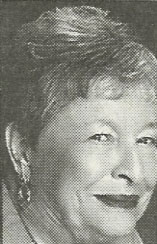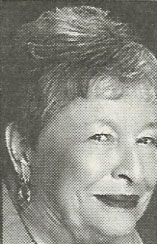Nurse Remembered for Giving Nature, Work With Babies
Robina Culpepper spent years helping newborn children and their mothers, and her work and character were never forgotten.
"Years after she retired, people would stop her on the street and tell her they remembered her gentle care of their babies," said her daughter, Kyra Ludwigson of Mahtomedi, Minn.
"She was just one of those people that was liked," said her son Dr. David Robbins of Albuquerque. "Very quickly, she would establish a rapport with people, it didn't matter if they were of different backgrounds."
Exa Robina Culpepper — "Robi" to those she knew — died Feb. 28. The Albuquerque resident was 79.
French Mortuary
From the mid-1960s, Culpepper was on staff at the Bernalillo County Indian Hospital and Bernalillo County Medical Center, first as head nurse in the newborn nursery and then in the Intensive Care/Premature Infant Care Unit. She went on to work in the University of New Mexico's Maternity and Infant Care Program before retiring in 1993.
"It was just so inherent in her nature to be a caretaker and to give to other people," Robbins said. "It was a tough job taking care of those newborn babies, premature babies. She felt she made a difference when she did that."
Born in Pampa, Texas, in the panhandle, Culpepper grew up during the Great Depression. Her parents were candy makers by trade.
She earned her nursing degree from Northwest Texas Hospital right out of high school and was soon married and had a daughter. In 1950, in her early 20s, she contracted polio and was paralyzed and hospitalized. "She actually was very close to dying," Robbins said. But Culpepper was able to regain the use of most of her muscles and walked on crutches for about a year afterward, Ludwigson said. "She was told not to have any more kids, but she ignored that and had three more," Robbins said. Ludwigson remembered that, in the late 1950s, the polio vaccine was being distributed at schools in the form of a sugar cube. "My mom stood in line for hours with us outside of the school where they were handing out the vaccine, tears streaming down her face, knowing that no one else would suffer the debilitating effects of the disease that robbed her of use of her muscles," she said. Culpepper moved to Albuquerque with her then-husband, a Sandia Laboratories employee.
While a stay-at-home mom, she volunteered as a candy striper at Presbyterian Hospital. She went to work at the Bernalillo County hospital in 1965 caring for infants.
"She was a terrifically competent nurse in the nursery and just made the place run very, very smoothly," said Dr. Bert Umland, who met her at the start of his medical career. She later became his patient.
Along with her "magnificent smile," Culpepper possessed a wonderful sense of humor and could be self-deprecating.
"She could poke fun very gently," Umland said. "She would find the humor in a situation and use that to sort of keep the atmosphere light when things got a little heavy."
Umland, now a physician with UNM's Department of Family and Community Medicine, remembers when he returned to the hospital in the late 1970s as a junior member of the faculty. He had a load of expenses and a low salary and Culpepper had been in to see him several times as a patient.
"At the end of one of our visits, she put her hand on mine and looked at me sort of out of the side of her eyes, which is how she looked at you, and with a big smile she said, 'Now, I don't want you to take this wrong, Bert, but, you know, now that you're on the faculty, you just need to look a little bit more classy. Your clothes are just, they're OK, but they need to be upgraded,' '' he says she told him.
" 'I want you to have this,' '' she continued, handing him an envelope. " 'I just want to make it better.' '' After she left, Umland opened it and found $100 so he could buy new clothes.
Culpepper was a real tough woman with a "velvet edge" — there was nothing sharp or hard about her, Umland said. "She was just this charming woman, and, in spite of this disability, it was never a disability for her," he said.
At 51, Culpepper returned to school, the University of Colorado at Denver, to become a pediatric nurse practitioner. She came back to Albuquerque as one of the state's first such practitioners.
She worked for UNM's Maternity and Infant Care program. Her job included helping mothers who needed prenatal care and food assistance through the state. She talked to young mothers about the advantages of breastfeeding.
In retirement, Culpepper volunteered at Oasis Senior Center and at Sombre del Monte Church, where she taught Sunday school and worked in the nursery.
She donated her body to the UNM School of Medicine.
Culpepper is survived by her daughters, Lynn Sullivan and her husband, David, of Albuquerque, Kyra Ludwigson and her husband, Jeff, of Mahtomedi, Minn., and Janna Bordeaux and her husband, Dean, of Phoenix; her son, Dr. David Robbins and his wife, Ruthie, of Albuquerque; and four grandchildren.
Nurse Remembered for Giving Nature, Work With Babies
Robina Culpepper spent years helping newborn children and their mothers, and her work and character were never forgotten.
"Years after she retired, people would stop her on the street and tell her they remembered her gentle care of their babies," said her daughter, Kyra Ludwigson of Mahtomedi, Minn.
"She was just one of those people that was liked," said her son Dr. David Robbins of Albuquerque. "Very quickly, she would establish a rapport with people, it didn't matter if they were of different backgrounds."
Exa Robina Culpepper — "Robi" to those she knew — died Feb. 28. The Albuquerque resident was 79.
French Mortuary
From the mid-1960s, Culpepper was on staff at the Bernalillo County Indian Hospital and Bernalillo County Medical Center, first as head nurse in the newborn nursery and then in the Intensive Care/Premature Infant Care Unit. She went on to work in the University of New Mexico's Maternity and Infant Care Program before retiring in 1993.
"It was just so inherent in her nature to be a caretaker and to give to other people," Robbins said. "It was a tough job taking care of those newborn babies, premature babies. She felt she made a difference when she did that."
Born in Pampa, Texas, in the panhandle, Culpepper grew up during the Great Depression. Her parents were candy makers by trade.
She earned her nursing degree from Northwest Texas Hospital right out of high school and was soon married and had a daughter. In 1950, in her early 20s, she contracted polio and was paralyzed and hospitalized. "She actually was very close to dying," Robbins said. But Culpepper was able to regain the use of most of her muscles and walked on crutches for about a year afterward, Ludwigson said. "She was told not to have any more kids, but she ignored that and had three more," Robbins said. Ludwigson remembered that, in the late 1950s, the polio vaccine was being distributed at schools in the form of a sugar cube. "My mom stood in line for hours with us outside of the school where they were handing out the vaccine, tears streaming down her face, knowing that no one else would suffer the debilitating effects of the disease that robbed her of use of her muscles," she said. Culpepper moved to Albuquerque with her then-husband, a Sandia Laboratories employee.
While a stay-at-home mom, she volunteered as a candy striper at Presbyterian Hospital. She went to work at the Bernalillo County hospital in 1965 caring for infants.
"She was a terrifically competent nurse in the nursery and just made the place run very, very smoothly," said Dr. Bert Umland, who met her at the start of his medical career. She later became his patient.
Along with her "magnificent smile," Culpepper possessed a wonderful sense of humor and could be self-deprecating.
"She could poke fun very gently," Umland said. "She would find the humor in a situation and use that to sort of keep the atmosphere light when things got a little heavy."
Umland, now a physician with UNM's Department of Family and Community Medicine, remembers when he returned to the hospital in the late 1970s as a junior member of the faculty. He had a load of expenses and a low salary and Culpepper had been in to see him several times as a patient.
"At the end of one of our visits, she put her hand on mine and looked at me sort of out of the side of her eyes, which is how she looked at you, and with a big smile she said, 'Now, I don't want you to take this wrong, Bert, but, you know, now that you're on the faculty, you just need to look a little bit more classy. Your clothes are just, they're OK, but they need to be upgraded,' '' he says she told him.
" 'I want you to have this,' '' she continued, handing him an envelope. " 'I just want to make it better.' '' After she left, Umland opened it and found $100 so he could buy new clothes.
Culpepper was a real tough woman with a "velvet edge" — there was nothing sharp or hard about her, Umland said. "She was just this charming woman, and, in spite of this disability, it was never a disability for her," he said.
At 51, Culpepper returned to school, the University of Colorado at Denver, to become a pediatric nurse practitioner. She came back to Albuquerque as one of the state's first such practitioners.
She worked for UNM's Maternity and Infant Care program. Her job included helping mothers who needed prenatal care and food assistance through the state. She talked to young mothers about the advantages of breastfeeding.
In retirement, Culpepper volunteered at Oasis Senior Center and at Sombre del Monte Church, where she taught Sunday school and worked in the nursery.
She donated her body to the UNM School of Medicine.
Culpepper is survived by her daughters, Lynn Sullivan and her husband, David, of Albuquerque, Kyra Ludwigson and her husband, Jeff, of Mahtomedi, Minn., and Janna Bordeaux and her husband, Dean, of Phoenix; her son, Dr. David Robbins and his wife, Ruthie, of Albuquerque; and four grandchildren.
Family Members
Sponsored by Ancestry
Advertisement
Advertisement








